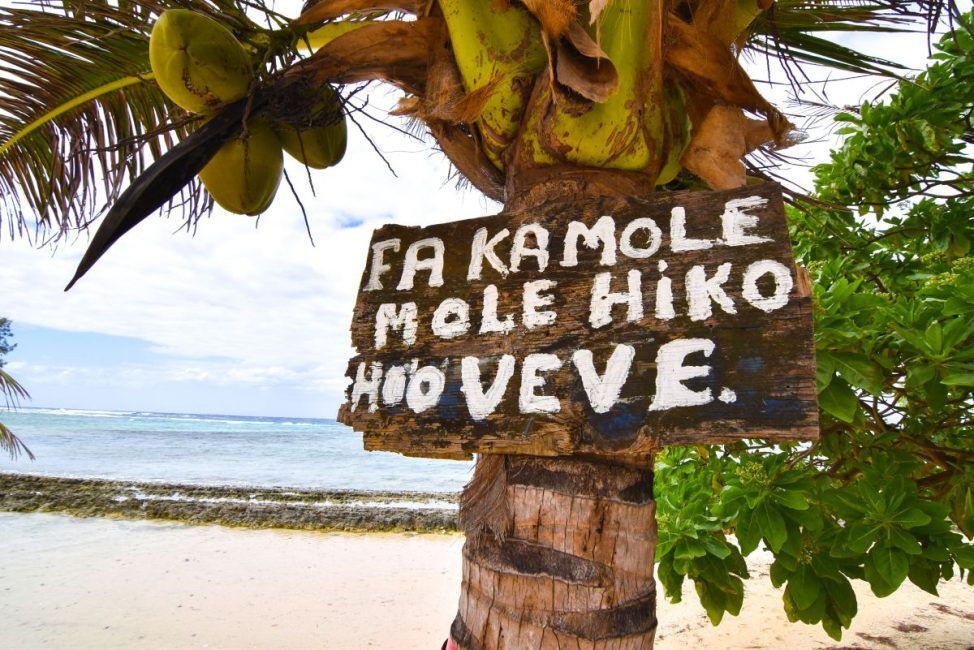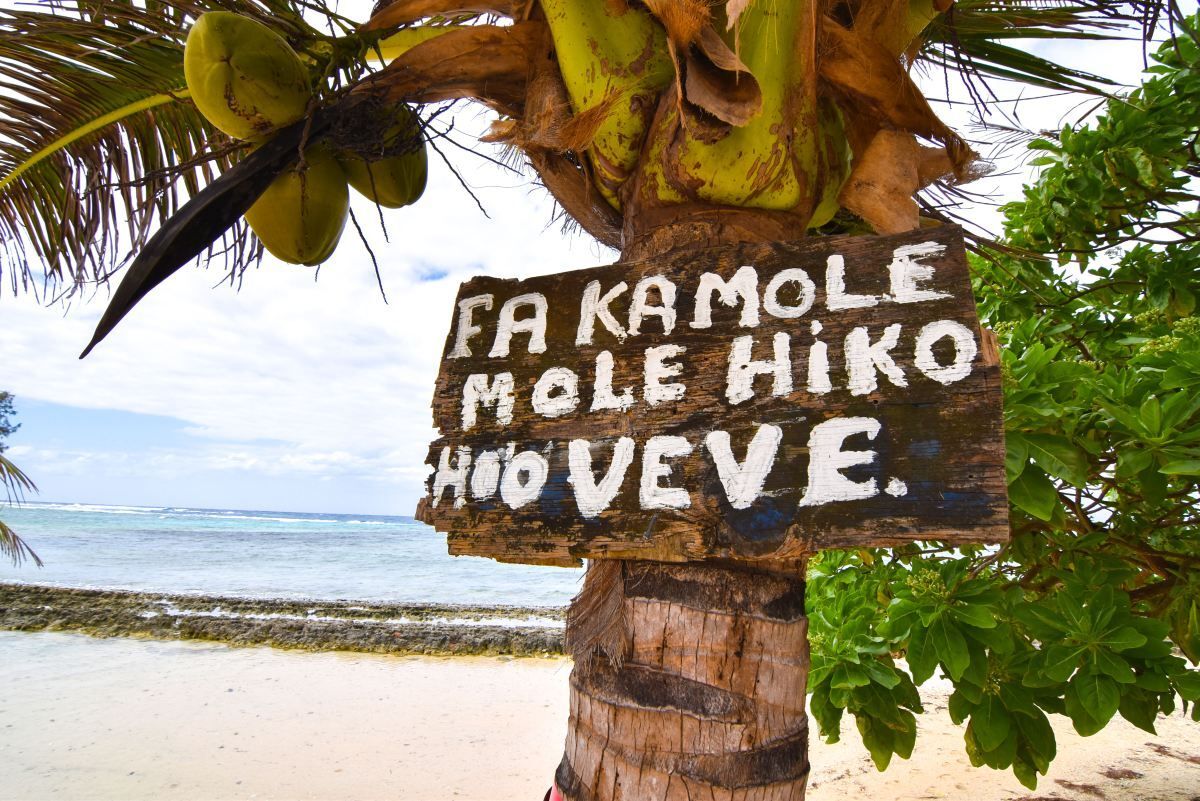The Guide to the Tonga Language: Lea Faka-Tonga
Tonga is home to two official languages: Tongan and English. While Tongan (Lea Faka-Tonga) is the most-used language, English is the second language of most Tongans in Tonga’s most populated islands, like Tongatapu and Vava’u. Nevertheless, you’re bound to encounter plenty of Tongan words and phrases during your getaway, from people saying “malo e lelei” to seeing “lu” on the menu and sleeping in a “fale”. Learn a little about the Tonga language in this quick guide to the language of Tonga.
For some quick words to learn, see the 10 Tongan Words You Need to Know When Visiting Tonga.
5 Fun Facts About the Tongan Language
- The Tongan language is locally known as “Fakatongan” or “Lea Faka-Tonga“!
- There are several numbering systems in Tonga, for instance, counting coconuts, yams or fish has a different numbering system for each
- The islanders of Niuafo’ou have their own unique dialect known as Niuafo’ouan
- There is a vowel in every single syllable pronounced in Tongan
- “Ng” is seen as one letter in the Tongan alphabet.
Love facts? We have more in the 20 Fun Facts About Tonga!
Where Does the Tongan Language Come From?
For those of you who like a bit of context, Tongan is part of a Polynesian branch of the huge Austronesian family of languages. Its closest relative languages are Samoan, Tahitian, Hawaiian, Niuean and Maori.
The same variety of Tongan (Lea Faka-Tonga) is spoken across the islands of Tonga, with no regional variants other than on the island of Niuafo’ou. The language in Niuafo’ou, which is Tonga’s northernmost island and closer to Samoa than the nearest island group Vava’u, is Niuafo’ouan, which has aspects of Samoan mixed in the dialect.
The Tongan language was first written by missionaries in the early 19th Century and has a number of spelling systems. The current spelling system for Tongan was officially proclaimed by the Privy Council of Tonga in 1943.
Learn a little more about the Tongan history in A Brief History of Tonga, as well as the Tongan culture in The Guide to the Tongan Culture for Travellers.
Pronunciations in Tongan
The Tongan language is fairly simple for English speakers to pronounce, knowing that all letters are fully voiced and there are no complicated constant clusters or diphthongs.
Interestingly, each syllable spoken ends in a vowel in Tongan, but be careful about using vowel length which can change the meaning of some words. A macron (ā, ē, etc.) is used to indicate a long vowel. The confusing thing for foreigners, however, is that although macrons are meant to be in writing, the practice is often neglected.
Tongan Pronunciation Rules
In short, some of the rules for Tongan pronunciation include:
- All letters are fully voiced
- Each syllable ends in a vowel and has one consonant
- Macrons indicate long vowels and count as one syllable
- Consonant clusters are not in the language – “ng” is not a constant cluster because it always represents just a single sound, acting as one letter in itself
- Stress falls on the second-to-last syllable of a word with two or more syllables, except for when the last vowel is long then the stress falls on that.
The Tongan Alphabet
There are 17 letters in the Tongan alphabet: a, e, i, f, g, h, k, l, m, n, ng, o, p, s, t, u and v. When pronouncing consonants on their own, you add an “a” to the end, so: fa, ha, ka, la, etc. The final letter of the Tongan alphabet is a glottal stop (fakaʻua).
How to Pronounce Vowels in Tongan
Tongan vowels are pronounced like the following:
- A as in “far”
- E as in “let”
- I as in “sit”
- O as in “hot”
- U as in “full”
Again, the thing to remember about Tongan vowels is the long and short vowel variants. Long vowels will be marked with a macron, which looks like: ā, ē, ī, ō and ū. However, you won’t always see the most accurate spellings for words that should have a macron vowel; vowel pronunciation is something you’ll usually learn with time.
How to Pronounce the Glottal Stop
The glottal stop is the apostrophe before or between vowels, such as in “Vava’u” as in the name of the island group or “‘Io” the word for “yes”. In Tongan, the glottal stop represents a closing of the throat in between the vowel sounds, instead of sounding the vowels in one flowing sound. So “Vava’u” is pronounced “Va-va-oo”.
Tongan Words and Phrases to Know
Although English is widely spoken, especially in Tongatapu and Vava’u, effort in speaking the local language is always appreciated. Here are some Tongan words and phrases to try out…
Basic Phrases in Tongan
Hello – Mālō e lelei
Yes – ‘Io
No – ‘Ikai
Please – Fakamolemole / Kātaki
Thank you – Mālō
Thank you very much – Mālō ‘aupito
Fefe hake? – How are you?
Sai pe – Fine/Ok
Excuse me – Kātaki tulou
I’m sorry – Fakamolemole atu
Goodbye (if staying) – ‘Alu ā
Goodbye (if leaving) – Nofo ā
‘Ofa atu – With love
Places in Tongan
Beach – Matātahi
House – Fale
Church – Fale Lotu
Shop – Fale Koloa
Restaurant – Fale Kai
Hospital – Fale Mahaki
Market – Māketi
Ocean – Moana
Palace – Palasi
Island – Motu
Village – Kolo
Tongan Food and Drink (and What They Are)
Talo – Taro, a root vegetable
Lū – Taro leaves
Ika – Fish
Siaine – Banana
Fainā – Pineapple
‘Ota ika – Raw fish in coconut cream and lime juice
‘Umu – Underground oven
Niu – Coconut
Manioke – Cassava, root vegetable
Fua ‘i ‘akau – Fruit
Vai – Water
‘Otai – Tongan fruit drink
Learn more about the food and drink in Tonga in the 10 Unique Foods in Tonga You Have to Try and in the 10 Drinks in Tonga You Have to Try.
Frequently Asked Questions About the Tonga Language
Finally, here are the most frequent questions travellers have about the language of Tonga.
What Language Do You Speak in Tonga?
The language you speak in Tonga is Tongan (Lea-Faka Tonga)! English is also an official language in Tonga.
What is a Tongan Greeting?
The most common Tongan greeting is “Mālō e lelei” which means “Hello”. A more formal way to greet someone in Tongan is “Malo ‘etau lava“. However, if you want to welcome someone, you can say “Me’a mai“.
How Do You Say Happy Tongan Language Week?
“‘Ofa ke mou ma’u ha Uike Kātoanga ‘I ‘o e Lea Faka-Tonga lelei mo fiefia” is how you say “Happy Tonga Language Week!”
How Do You Say I Love You in Tonga?
“‘Oku ou ‘ofa au ‘ia koe” means “I love you” in Tongan.
More About the Tonga Language and Culture
That’s it for our guide to the Tonga language. For more insightful articles like this, check out the following:
- The Guide to the Tongan Culture and Traditions
- The Best Islands to Visit in Tonga
- The Guide to the Religions in Tonga
Finally, if there’s anything we’ve missed, you’re likely to find it in Who are the People of Tonga?
Author
Robin (Lopini) C.
This article was reviewed and published by Robin, the co-founder of Tonga Pocket Guide. He has lived, worked and travelled across 16 different countries before settling in the South Pacific, so he knows a thing or two about planning the perfect trip in this corner of the world. Robin works and consults regularly with the Ministry of Tourism of Tonga. Robin is also the co-founder of several other South Pacific travel guides and is a regular host of webinars with the South Pacific Tourism Organisation.

